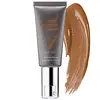What's inside
What's inside
 Key Ingredients
Key Ingredients

 Benefits
Benefits

 Concerns
Concerns

 Ingredients Side-by-side
Ingredients Side-by-side

Water
Skin ConditioningCyclopentasiloxane
EmollientCyclohexasiloxane
EmollientC13-15 Alkane
SolventDimethicone
EmollientEthylhexyl Methoxycinnamate
UV AbsorberLauryl PEG-10 Tris(Trimethylsiloxy)Silylethyl Dimethicone
EmulsifyingMagnesium Sulfate
Polyglyceryl-4 Isostearate
EmulsifyingCetyl PEG/PPG-10/1 Dimethicone
EmulsifyingHexyl Laurate
EmollientMica
Cosmetic ColorantButylene Glycol
HumectantVaccinium Vitis-Idaea Seed Oil
AntioxidantCetearyl Dimethicone Crosspolymer
Phenoxyethanol
PreservativeTitanium Dioxide
Cosmetic ColorantDimethicone/Divinyldimethicone/Silsesquioxane Crosspolymer
HumectantDisteardimonium Hectorite
StabilisingSilica
AbrasiveAluminum Hydroxide
EmollientPropanediol
SolventPropylene Carbonate
SolventPEG-8
HumectantEthylhexylglycerin
Skin ConditioningHydrogen Dimethicone
Tocopherol
AntioxidantSodium Lauroyl Glutamate
Hydrated Silica
AbrasiveTriethoxycaprylylsilane
Lysine
Skin ConditioningMagnesium Chloride
Ascorbyl Palmitate
AntioxidantAscorbic Acid
AntioxidantCitric Acid
BufferingHelianthus Annuus Seed Oil
EmollientRosmarinus Officinalis Leaf Extract
AntimicrobialParfum
MaskingIron Oxides
CI 77891
Cosmetic ColorantWater, Cyclopentasiloxane, Cyclohexasiloxane, C13-15 Alkane, Dimethicone, Ethylhexyl Methoxycinnamate, Lauryl PEG-10 Tris(Trimethylsiloxy)Silylethyl Dimethicone, Magnesium Sulfate, Polyglyceryl-4 Isostearate, Cetyl PEG/PPG-10/1 Dimethicone, Hexyl Laurate, Mica, Butylene Glycol, Vaccinium Vitis-Idaea Seed Oil, Cetearyl Dimethicone Crosspolymer, Phenoxyethanol, Titanium Dioxide, Dimethicone/Divinyldimethicone/Silsesquioxane Crosspolymer, Disteardimonium Hectorite, Silica, Aluminum Hydroxide, Propanediol, Propylene Carbonate, PEG-8, Ethylhexylglycerin, Hydrogen Dimethicone, Tocopherol, Sodium Lauroyl Glutamate, Hydrated Silica, Triethoxycaprylylsilane, Lysine, Magnesium Chloride, Ascorbyl Palmitate, Ascorbic Acid, Citric Acid, Helianthus Annuus Seed Oil, Rosmarinus Officinalis Leaf Extract, Parfum, Iron Oxides, CI 77891
Hyaluronic Acid
HumectantGlycyrrhiza Glabra Root Extract
BleachingPrunus Mume Flower
AntioxidantWater
Skin ConditioningCoco-Caprylate/Caprate
EmollientZinc Oxide 15%
Cosmetic ColorantVitis Vinifera Seed Oil
EmollientC15-19 Alkane
SolventIsocetyl Stearoyl Stearate
EmollientArgania Spinosa Kernel Oil
EmollientTocopheryl Acetate
AntioxidantSodium Hyaluronate Crosspolymer
HumectantJojoba Esters
EmollientTribehenin
EmollientBeeswax
Emulsion StabilisingGlyceryl Stearate
EmollientLeuconostoc/Radish Root Ferment Filtrate
AntimicrobialGlycerin
HumectantLactobacillus
Skin ConditioningAcacia Senegal Gum
MaskingXanthan Gum
EmulsifyingViola Tricolor Extract
EmollientBisabolol
MaskingSodium Hyaluronate
HumectantAloe Barbadensis Leaf Extract
EmollientCocos Nucifera Fruit Extract
EmollientTitanium Dioxide
Cosmetic ColorantIron Oxides
Mica
Cosmetic ColorantHyaluronic Acid, Glycyrrhiza Glabra Root Extract, Prunus Mume Flower, Water, Coco-Caprylate/Caprate, Zinc Oxide 15%, Vitis Vinifera Seed Oil, C15-19 Alkane, Isocetyl Stearoyl Stearate, Argania Spinosa Kernel Oil, Tocopheryl Acetate, Sodium Hyaluronate Crosspolymer, Jojoba Esters, Tribehenin, Beeswax, Glyceryl Stearate, Leuconostoc/Radish Root Ferment Filtrate, Glycerin, Lactobacillus, Acacia Senegal Gum, Xanthan Gum, Viola Tricolor Extract, Bisabolol, Sodium Hyaluronate, Aloe Barbadensis Leaf Extract, Cocos Nucifera Fruit Extract, Titanium Dioxide, Iron Oxides, Mica
 Reviews
Reviews

Alternatives
Ingredients Explained
These ingredients are found in both products.
Ingredients higher up in an ingredient list are typically present in a larger amount.
Mica is a naturally occurring mineral used to add shimmer and color in cosmetics. It can also help improve the texture of a product or give it an opaque, white/silver color.
Serecite is the name for very fine but ragged grains of mica.
This ingredient is often coated with metal oxides like titanium dioxide. Trace amounts of heavy metals may be found in mica, but these metals are not harmful in our personal products.
Mica has been used since prehistoric times throughout the world. Ancient Egyptian, Indian, Greek, Roman, Aztec, and Chinese civilizations have used mica.
Learn more about MicaTitanium dioxide is a mineral UV filter widely used in sunscreens and cosmetics.
It is one of only two UV filters officially classified as “mineral” by regulatory agencies, the other being zinc oxide.
Titanium dioxide provides broad-spectrum protection mostly in the UVB and UVAII range, with some protection in the UVAI range.
While its UVA protection isn’t as strong as zinc oxide’s, the difference is minor.
A common myth is that mineral UV filters reflect UV light. However, modern research shows titanium dioxide absorbs UV radiation like chemical filters (~95% absorption & 5% reflection).
Thanks to its non-irritating nature, titanium dioxide is suitable for sensitive, acne-prone, or redness-prone skin. It is unlikely to cause "eye sting" like other sunscreen ingredients.
A major drawback of this ingredient is its white cast and thick texture. This is why mineral sunscreens often leave a white cast and are less cosmetically elegant than chemical/hybrid sunscreens.
To improve white cast and spreadability, micronized or nano-sized titanium dioxide is often used.
There are ongoing concerns surrounding nano-titanium oxide's impact on marine ecosystems.
There is no conclusive evidence that any form of titanium oxide (or any other sunscreen ingredients) will cause harm to marine ecosystems or coral reefs. The science is still developing but many consumers are keeping a close eye on this issue.
Please note, many destinations have reef-safety sunscreen rules. For instance, the U.S. Virgin Islands advises all visitors to use non-nano mineral sunscreens.
Nano mineral sunscreens once raised safety concerns about absorption into skin.
Extensive research has shown that they do not penetrate healthy or damaged skin; they remain safely on the surface and the top layer of dead skin (stratum corneum).
You'll likely find titanium dioxide bundled with alumina, silica, or dimethicone. These ingredients help make titanium dioxide highly photostable; this prevents it from interacting with other formula components under UV light.
Learn more about Titanium DioxideWater. It's the most common cosmetic ingredient of all. You'll usually see it at the top of ingredient lists, meaning that it makes up the largest part of the product.
So why is it so popular? Water most often acts as a solvent - this means that it helps dissolve other ingredients into the formulation.
You'll also recognize water as that liquid we all need to stay alive. If you see this, drink a glass of water. Stay hydrated!
Learn more about WaterThis ingredient is a combination of red, black, and yellow iron oxide pigments. This combination of colors is usually found in foundation, because it results in a "skin" color.